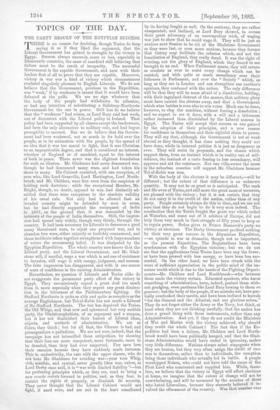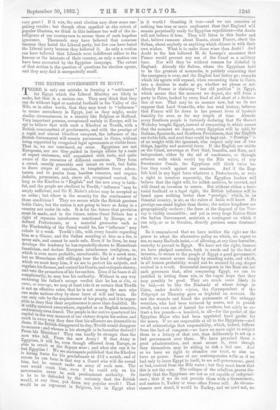TOPICS OF THE DAY
THE PARTY RESULT OF THE EGYPTIAN SUCCESS.
THERE is no reason for doubting, though Tories do keep saying it as if they liked the argument, that the Liberal Government has gained in strength by the victory in Egypt. Success always succeeds, more or less, especially in Democratic countries, the mass of mankind still believing that failure must be the result of incapacity. The successful Government is the capable Government, and men wish their leaders first of all to prove that they are capable. Moreover, victory in war was a kind of victory which circumstances rendered singularly pleasant to English Liberals. We do not believe that the Government, previous to the Expedition, was "weak," if by weakness is meant that it would have been
defeated at the polls. We see no sign whatever that the body of the people had withdrawn its adhesion, or had any intention of substituting a Salisbury-Northcote Government for the one in power. Still less do we believe that the " weakness " had arisen, as Lord Bury said last week, out of discontent with the Liberal policy in Ireland. That policy had been supported by all classes except the landowners, had been the only alternative to military rule, and had begun perceptibly to succeed. But we do believe that the Govern- ment had been weakened, not so much in its hold over the people, as in its estimation with the people, by the spread of an idea that it was too moral to fight, that it was Christian to an impracticable degree, and that it considered no interest, whether of England or of mankind, equal to the interest of both in peace. There never was the slightest foundation for such an illusion. Mr. Gladstone had never denounced war, though he had denounced many wars, and had taken his share in many. His Cabinet consisted, with one exception, of men who, like Lord Granville, Lord Hartington, Lord North- brook, and Mr. Childers, were free even from the suspicion of bolding such doctrines ; while the exceptional Member, Mr. Bright, though, no doubt, opposed to war, had distinctly ad- mitted that there were exceptions to the absolute validity of his usual rule. Not only had he allowed that an invaded country might be defended by men in arms, but he had directly supported the reconquest of India in 1857, on the ground that it was demanded by the interests of the people of India themselves. Still, the impres- sion had spread very widely, though very thinly, through the country. It had been necessary for Liberals to denounce a good many threatened wars, to reject one proposed war, and to abandon two wars, either unjustly or foolishly commenced, and those incidents taken together strengthened with large numbers of voters the unreasoning belief. It was dissipated by the Egyptian Expedition. The whole country now knows that the Liberal" party, and the Liberal Government, and Mr. Glad- stone will, if needful, wage a war which is not one of resistance to invasion, will wage it with energy, judgment., and success. The false impression has disappeared, and with it one source of want of confidence in the existing Administration.
Nevertheless, we question if Liberals and Tories alike do not exaggerate the permanent party effect of the victory in Egypt. They unconsciously expect a great deal too much from it, more especially when they expect any great diminu- tion in the bitterness of the Parliamentary fighting. Sir Stafford North cote is quite as able and quite as receptive as the average Englishman, but Tel-el-Kebir has not made a Liberal of Sir Stafford Northcote. The war has deprived the Tories, the Old Whigs, and that new and ephemeral but very audible party, the Gladstonophobists, of an argument and a weapon, but it has not diminished their hatred of Liberal ideas, objects, and methods of administration. We are at Cairo, they think ; but for all that, the Closure is bad, and primogeniture a palladium. We are not sure, indeed, that the campaign has not intensified these antipathies, by showing that their foes are more competent, more fortunate, more to be dreaded, than they had ever suspected. Few men love their enemies because they have suddenly made fortunes. This is, undoubtedly, the case with the upper classes, who do not hate Mr. Gladstone for avoiding war—your true Whig, rich, sensible, and cynical, never greatly likes war, unless, as Lord Derby once said, it is "war with limited liability "—but for professing principles which, as they see, tend to bring a new couche sociale forward in politics, and, as they fear, to restrict the rights of property, or diminish its security. They never thought that the Liberal Cabinet would not fight, if need were, and are not in the least conciliated by its having fought so well. On the contrary, they are rather exasperated, and inclined, as Lord Bury showed, to accuse their great adversary of an unscrupulous trick, of waging war just to show that he could wage it. They will be just as anxious next Session to be rid of the Gladstone Government as they were last, or even more anxious, because they foresee that victory may facilitate the reforms which, and not the humiliation of England, they really dread. It was the right of evicting, not the glory of England, which they feared to see brought to an end. When Parliament meets, they will return as resolute as ever to resist every change which can be' resisted, and with quite as much ascendancy over their followers in Parliament, and over the " Society " which, as long as they are in London and can strengthen one another's opinions, they confound with the nation. The only difference will be that they will be more afraid of a dissolution, holding, with their ingrained distrust of the masses, that military glory must have carried the electors away, and that a Government which wins battles is sure also to win votes. Much can be done, however, to clog the machine, without forcing a dissolution ; and we expect to see it done, with a will and a bitterness rather increased than diminished by the Liberal success in Egypt. The Tories will accept that success as one gained by the adoption of their principles, and a new reason for confidence in themselves and their rightful claim to power. They will say that, although the Government is not so weak abroad as they thought, it has done nothing they could not have done, while in internal politics it is just as dangerous as ever. They will resist its proposals, and the classes which support them, from an instinct which is in reality one of self- defence, the instinct of a caste fearing to lose ascendancy, will approve and aid the resistance. Not one villa-owner the more in the suburban counties will support Mr. Gladstone because Tel-el-Kebir was won.
With the body of the electors it may be different,—will be different ; but the extent of that difference is an unknown quantity. It may not be so great as is anticipated. The rank and file even of Tories, and still more the great mass of waverers, are pleased with the victory ; but it is not certain that they do not carry it to the credit of the nation, rather than of any party. People certainly always do this in time, and we are not sure that they do not begin to do it very soon indeed. The recollection that the Tories fought the great war which ended at Waterloo, and came out of it arbiters of Europe, did nat help them very much in their struggle of fifty years to keep or to regain power. Sedan gives to Prince Bismarck's party no victory at elections. The Derby Government profited nothing by their very great success in the Abyssinian Expedition, —an episode in war as dramatic, though not as important, as the present Expedition. The Registrations have been synchronous with the Egyptian victories • but we do not see that the applications from Tories have been any the fewer, or have been pressed with less energy, or have been less suc- cessful. On the other hand, we have been struck with the want of sufficient appreciation in the public mind of the im- mense credit which is due to the heads of the Fighting Depart- ments—Mr. Childers and Lord Northbrook—who between them made the victory certain. Educated speakers, who know something of administration, have, indeed, praised them with-
out grudging, even partisans Lord Bury bowing to them en, passant; but the body of the people, if we mistake not, have par- tially overlooked their merits, and have been inclined to hurrah "for the General and the Admiral, and our glorious selves.' They do not forget either the Army or the Navy, but think, at least when they are not thinking carefully, that the nation has done a grand thing with those instruments, rather than any Administration. And yet, if they do not credit the Ministers of War and Marine with the victory achieved, why should they 'credit the whole Cabinet ? The fact that if the Ex- pedition had been a failure, Mr. Childers and Lord North- brook would have been politically hanged, and that the Glad- stone Administration would have ended in ignominy, makes very little difference. Nations always select scapegoats when they are beaten, but they very often assign the credit of suc- cess to themselves, rather than to individuals, the exception being those individuals who actually led in battle. A people worshipped Nelson, who could not have told the name of the First Lord who nominated and supplied him. While, there- fore, we believe that the victory in Egypt will affect elections at home, we imagine that the extent of change will not be overwhelming, and will be measured by the number of those who hated Liberalism, because they sincerely believed it in- volved the effacement of the country, Was that number ever
very great ? If it was, the next election may show some sur- prising results ; but though often appalled at 'the extent of popular illusions, we think in this instance too well of the in- telligence of our countrymen to accuse them of such hopeless ignorance. Thousands may have believed that nonsense because they hated the Liberal party, but few can have hated the Liberal party because they believed it. As only a section can have believed that Liberals were indifferent either to the honour or the interests of their country, so only a section can have been converted by the Egyptian campaign. The extent of that section is the question of questions for election agents, and they may find it unexpectedly small.



































 Previous page
Previous page